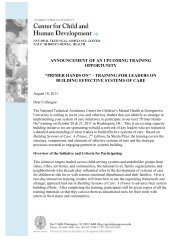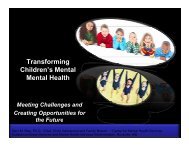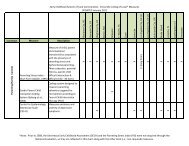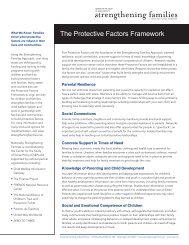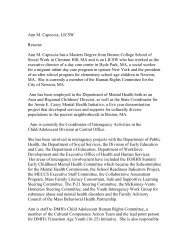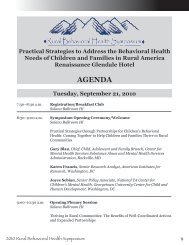Training Institutes 2012 - National Technical Assistance Center for ...
Training Institutes 2012 - National Technical Assistance Center for ...
Training Institutes 2012 - National Technical Assistance Center for ...
You also want an ePaper? Increase the reach of your titles
YUMPU automatically turns print PDFs into web optimized ePapers that Google loves.
TARGETED INSTITUTE #9 9:30 AM SUNDAY • SUN C<br />
Racial and Ethnic Disparities in Systems of Care: Confronting Issues…Creating Solutions<br />
OBJECTIVES—Participants will learn:<br />
1. To define and differentiate between disparities in mental health status and mental health care among racial and<br />
ethnic groups<br />
2. To list and describe factors that contribute to these disparities in their settings<br />
3. To describe the advantages and limitations of cultural and linguistic competence in addressing racial and ethnic<br />
disparities in mental health<br />
4. To create a disparities action plan with practical strategies to implement in their respective settings<br />
This Targeted Institute will focus on the identification of contributing factors to racial and ethnic disparities in children’s<br />
mental health and development of an action plan to address such disparities. Faculty will highlight approaches including<br />
data-driven strategies to uncover disparities and measure progress <strong>for</strong> racially and ethnically diverse children, youth, and<br />
their families and specific ways in which cultural competence and linguistic competence can address racial and ethnic<br />
disparities in mental health care.<br />
These strategies emerge from a synthesis of the literature and the experience of the faculty in conducting research and<br />
providing training, technical assistance, and consultation on the essential role of cultural and linguistic competence in<br />
decreasing racial, ethnic, and other disparities and promoting equity across child-serving systems.<br />
Specific topics to be covered include:<br />
• Definitions and conceptual frameworks to explain the multiple dimensions of disparities (i.e., differentiating<br />
disparities in mental health status and outcomes from disparities in mental health care including the 5 As—<br />
availability, accessibility, af<strong>for</strong>dability, appropriateness, and acceptability)<br />
• Factors that contribute to racial and ethnic disparities at the cultural group level (norms, traditions, and world view);<br />
interpersonal level (interaction between practitioner and service recipients including the role of bias); and societal<br />
level (social determinants of mental illness to include structural “isms”)<br />
• Role of cultural and linguistic competence at both the individual and organizational levels that can address the<br />
a<strong>for</strong>ementioned challenges<br />
• Examination of issues and application of strategies and potential solutions based on the socio-cultural contexts of the<br />
participants’ respective settings<br />
Participants will be engaged in an interactive “Sticky Wall” exercise. Each participant will create an individual<br />
“Addressing Disparities Plan of Action” <strong>for</strong> implementation in their organizational and program settings.<br />
Both presenters are members of the faculty of the <strong>National</strong> <strong>Center</strong> <strong>for</strong> Cultural Competence (NCCC) at Georgetown<br />
University and bring perspectives from the mental health world with a particular interest in the impact of bias, the<br />
“isms”, and processes of mental health service delivery on disparities in mental health care, as well as knowledge and<br />
experience related to cultural and linguistic competence across a broad spectrum of human service fields.<br />
MODERATOR/PRESENTER: Vivian Jackson, Ph.D., Senior Policy Associate, <strong>National</strong> <strong>Center</strong> <strong>for</strong> Cultural<br />
Competence and the <strong>National</strong> <strong>Technical</strong> <strong>Assistance</strong> <strong>Center</strong> <strong>for</strong> Children’s Mental Health, Georgetown University <strong>Center</strong><br />
<strong>for</strong> Child and Human Development, Washington, DC<br />
Tawara Goode, M.A., Director and Assistant Professor, <strong>National</strong> <strong>Center</strong> <strong>for</strong> Cultural Competence, Georgetown<br />
University <strong>Center</strong> <strong>for</strong> Child and Human Development, Washington, DC<br />
<strong>Training</strong> <strong>Institutes</strong> <strong>2012</strong><br />
TARGETED INSTITUTES<br />
101



